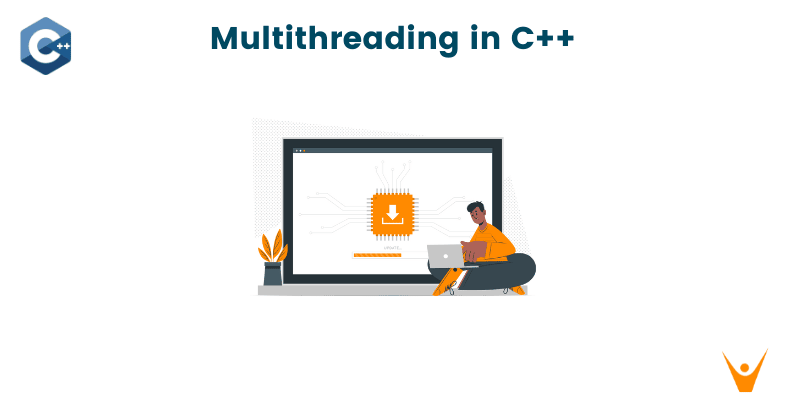Multithreading has emerged as a fundamental concept in modern C++ programming, enabling developers to harness the power of parallelism and concurrency. In this article, we will explore the world of multithreading in C++, and discuss the number of threads one can have in C++.
What is Multithreading in C++?
Multithreading refers to the execution of multiple threads concurrently within a single program. Multithreading in C++ is achieved through the threading library, which provides classes and functions to create, manage, and synchronize threads.
By utilizing multithreading, developers can break down complex tasks into smaller, independent units that can be executed simultaneously, thus maximizing CPU utilization and reducing overall execution time.
By executing multiple threads simultaneously, C++ applications can achieve improved performance, responsiveness, and resource utilization.
Let's consider an example to illustrate the usage of multithreading in C++. Assume we have a function `calculatePrimeNumbers()` that calculates prime numbers within a given range. We can parallelize this task by dividing the range among multiple threads and executing the calculations concurrently.
#include <iostream> #include <thread> #include <vector> void calculatePrimeNumbers(int start, int end) { // Calculate prime numbers within the given range // ... } int main() { const int numThreads = 4; const int rangeStart = 1; const int rangeEnd = 100; std::vector<std::thread> threads; int rangeSize = (rangeEnd - rangeStart + 1) / numThreads; int rangeRemainder = (rangeEnd - rangeStart + 1) % numThreads; int start = rangeStart; int end = start + rangeSize - 1; for (int i = 0; i < numThreads; ++i) { if (i == numThreads - 1) { end += rangeRemainder; } threads.emplace_back(calculatePrimeNumbers, start, end); start = end + 1; end = start + rangeSize - 1; } for (std::thread& t : threads) { t.join(); } return 0; }
In the above code, we create a vector of threads and divide the range `[1, 100]` among four threads. Each thread is responsible for calculating prime numbers within its assigned range. By executing the calculations concurrently, we can leverage the power of multithreading to improve the overall efficiency of the program.
Why Do We Need Multithreading in C++?
Multithreading in C++ offers several benefits and is crucial in various scenarios. Some key reasons why we need multithreading in C++ include:
- Enhanced Performance: Multithreading allows us to leverage the capabilities of modern multi-core processors, enabling the execution of multiple tasks simultaneously. This can significantly improve the performance and responsiveness of applications.
- Concurrency and Responsiveness: Multithreading enables the execution of multiple tasks concurrently, enhancing the responsiveness of applications, especially in scenarios where there are multiple I/O operations or time-consuming computations.
- Resource Utilization: Multithreading enables efficient utilization of system resources by distributing workloads among threads, thereby maximizing CPU utilization and reducing idle time.
Single Thread vs. Multithreaded Approaches
A single-threaded approach involves executing tasks sequentially within a single thread. This approach is simpler and suitable for scenarios where tasks are independent and there is no need for parallelism or concurrency.
On the other hand, a multithreaded approach allows tasks to be executed simultaneously in multiple threads, enabling parallelism and concurrency. This approach is beneficial when dealing with complex tasks that can be divided into smaller, independent units, providing opportunities for performance optimization and resource utilization.
How Many Threads Can You Have in C++?
The number of threads one can have in C++ depends on various factors, including the hardware, operating system, and application requirements. Modern processors typically support multiple cores and threads, allowing for the execution of several threads simultaneously.
However, creating an excessive number of threads may result in diminishing returns due to thread management overhead and resource limitations. It is essential to strike a balance between the number of threads and the available hardware resources to achieve optimal performance.
Do C++ Threads Share Memory?
By default, C++ threads share the same memory space within a process. This means that threads can access and modify shared variables, leading to potential data races and synchronization issues. It is crucial to ensure proper synchronization mechanisms, such as mutexes or atomic operations, to coordinate access to shared data and prevent race conditions.
Conclusion
Multithreading is a powerful concept in C++ programming and applications can achieve enhanced performance, responsiveness, and resource utilization with it. So, embrace its power and unlock the true potential of your applications.








